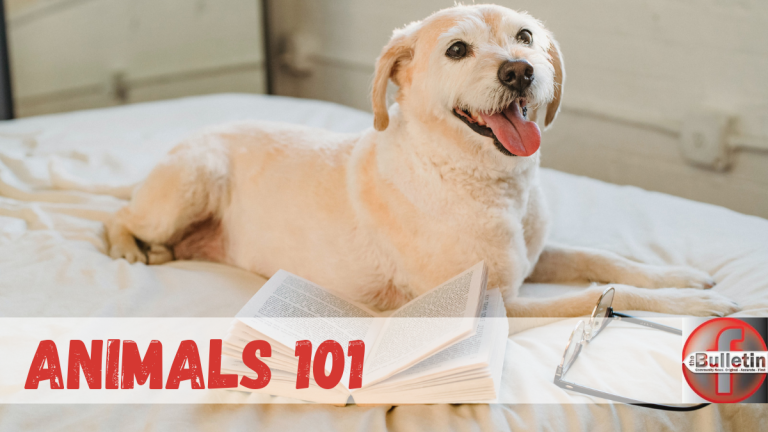
A USEFUL GUIDE TO SEE WHETHER YOU MEET THE CRITERIA OF A RESPONSIBLE PET OWNER.
Have you cleaned your pet’s kennel or cage today or their water and food bowl? Have you made sure to feed them and provide fresh clean drinking water before eating yourself? Have you made the effort to say hello to them today? Your animals never really got a choice as to where they end up. You chose to have them and taking care of them and meeting their every need is not something optional for responsible pet guardians. It is a privilege to share your life with an animal companion and this responsibility should not be taken lightly. We make time for things that are a priority to us…..no excuses!
Before you even get any species of animal, you need to do proper homework on their needs and the cost involved. In addition to meeting your pet’s basic needs like food, water, shelter, health and basic care, there are some extremely important rules of responsible pet ownership you need to know about to keep your pet in good health and enjoying life.
The American Veterinary Medical Association (AVMA) lists six areas of responsible pet ownership, including commitment, investment, obeying local ordinances, ensuring your dog is properly identified, limiting his or her reproduction, and preparing for emergencies and other life-changing events.
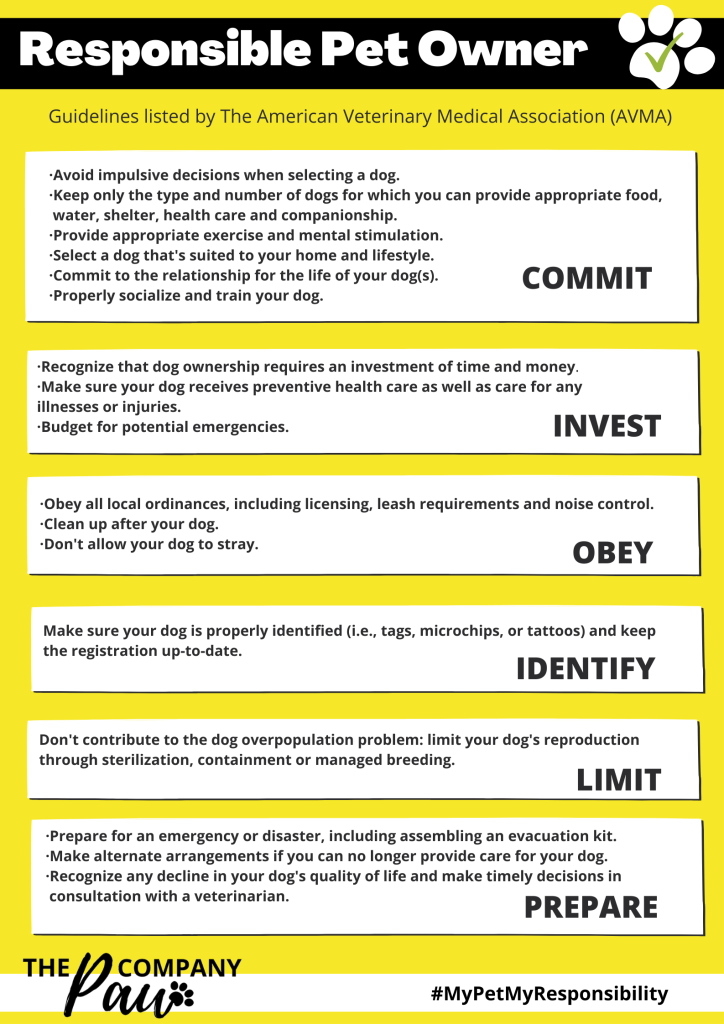
COMMIT
- Avoid impulsive decisions when selecting a dog.
- Select a dog that’s suited to your home and lifestyle.
- Provide appropriate exercise and mental stimulation.
- Properly socialize and train your dog.
- Commit to the relationship for the life of your dog(s).
- Keep only the type and number of dogs for which you can provide appropriate food, water, shelter, health care and companionship.
INVEST
- Recognize that dog ownership requires an investment of time and money.
- Make sure your dog receives preventive health care as well as care for any illnesses or injuries.
- Budget for potential emergencies.
OBEY
- Clean up after your dog.
- Obey all local ordinances, including licensing, leash requirements and noise control.
- Don’t allow your dog to stray.
IDENTIFY
- Make sure your dog is properly identified (i.e., tags, microchips, or tattoos) and keep the registration up-to-date.
LIMIT
- Don’t contribute to the dog overpopulation problem: limit your dog’s reproduction through sterilization, containment, or managed breeding (The Paw Company does not support any breeding while there is a massive overpopulation crisis).
PREPARE
- Prepare for an emergency or disaster, including assembling an evacuation kit.
- Make alternate arrangements if you can no longer provide care for your dog.
- Recognize any decline in your dog’s quality of life and make timely decisions in consultation with a veterinarian.
FOUR PAWS SHARE THE FOLLOWING ON RESPONSIBLE PET OWNERSHIP
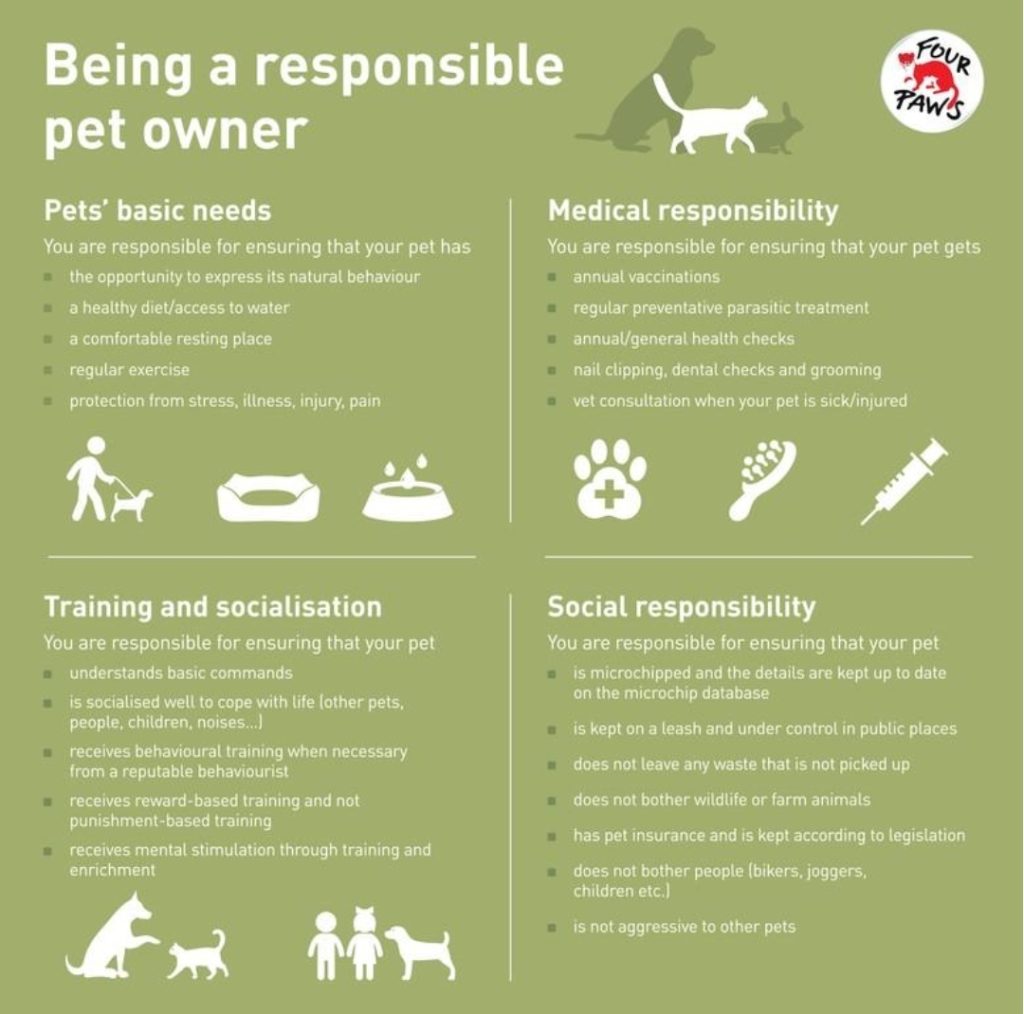
PET’S BASIC NEEDS
You are responsible for ensuring that your pet has:
- the opportunity to express their natural behaviour;
- healthy diet and access to fresh water;
- a comfortable resting place;
- regular exercise;
- protection from stress, illness, and injury.
MEDICAL RESPONSIBILITY
You are responsible for ensuring that your pet gets:
- annual vaccinations;
- regular preventative parasitic treatment;
- annual/general health checks;
- nail clipping, dental checks and grooming;
- vet consultation when your pet is sick/injured.
TRAINING & SOCIALIZATION
You are responsible for ensuring that your pet:
- understands basic commands;
- is socialized well to cope with life (other pets, people, children, noises);
- receives behavioural training, when necessary, from a reputable behaviourist;
- receives reward-based training and not punishment-based training;
- receives mental stimulation through training and enrichment.
Also, read tips to keep your pets warm in cold weather
SOCIAL RESPONSIBILITY
You are responsible for ensuring that your pet:
- is microchipped and the details are kept up to date on the microchip database;
- is kept on a leash and under control in public places;
- does not leave any waste that is not picked up;
- does not bother wildlife or farm animals;
- has pet insurance or funds for emergencies;
- is kept according to legislation;
- does not bother people (bikers, joggers, etc.);
- is not aggressive toward other pets.
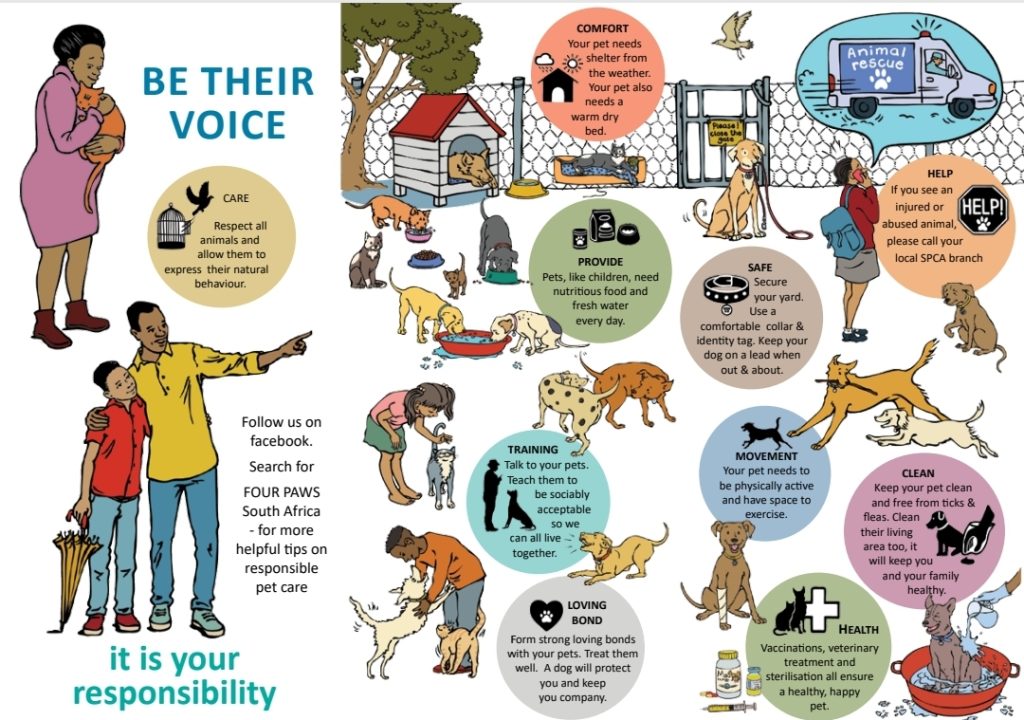
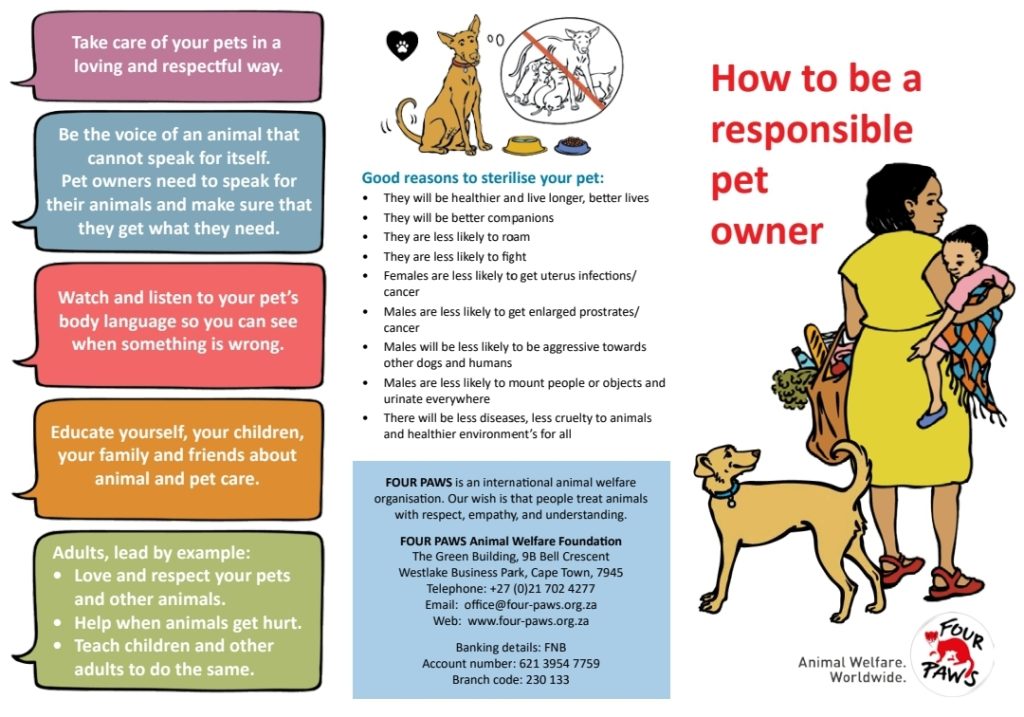
Image by Four Paws
RESPONSIBLE PET OWNER TEST
How well do you score on our basic responsible owner test? Give yourself one point out of 10 for each yes answer.
1. Can you commit for their whole life and do they fit your lifestyle?
2. Are your pet’s vaccinations, worm and parasite treatment up-to-date?
3. Do you know and are you obeying the local laws on having pets?
4. Are your pets sterilized?
5. Are your pets safe and secure in your yard and not allowed to roam the street freely?
6. Are your pets microchipped and the chip registered and do they have a collar ID?
7. Are they on healthy weight?
8. Do you meet the enrichment needs for your pets, including, social, mental stimulation and regular exercise?
9. Does your pets have access to fresh drinking water daily and do they get the right specie appropriate food?
10. Are you prepared for an emergency and for when something happens to you – are they included in your will?
Being a responsible pet parent is about more than just these 10 points. It also means learning to pick up on your pets’ often-subtle communication cues, as well as helping your pet learn human communication signals through proper handling, socialization and training. Being a responsible pet guardian is a privilege, with responsibility and a serious commitment that takes time and energy. Commit fully, or don’t get a pet! It is that simple!
Next week we will take a look again at what to do when you lost or found an animal.
WHEN YOU KNOW BETTER, DO BETTER!
#responsiblepetownership #ResponsiblePetOwner #Care #MyPetMyResponsibility